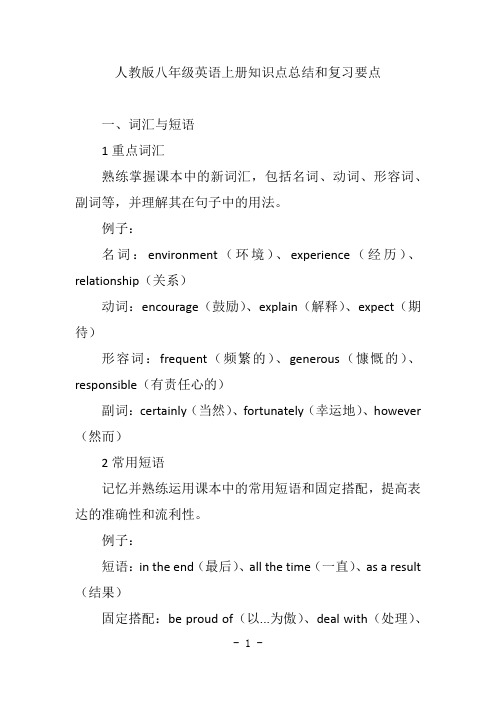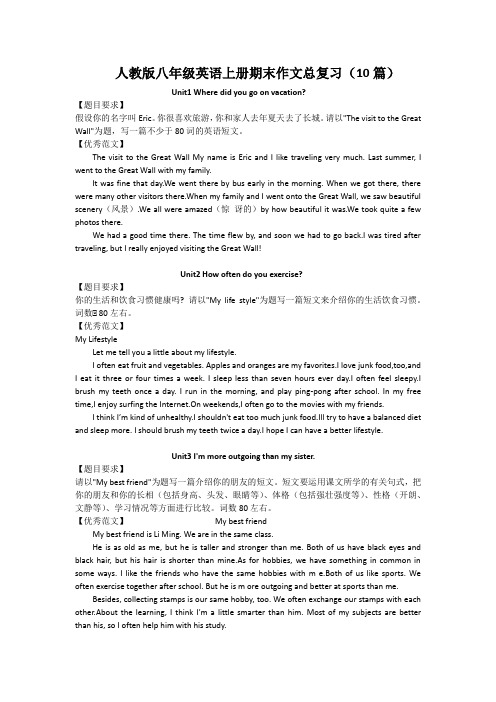八年级英语上册总复习
期末总复习课件(共47张PPT) 人教版英语八年级上册.ppt

一般现在时的关键词:always,(总是),often(经常), usually (通常), never从未;every day每天, every week每周, every year每年, sometimes有时候, at times时常。
A.as better as B.as good as √C.as well as
( )8.The programs on Channel 10 are ____better than Channel 5.
A.more
√B.much
C.many
( )9.He is _____than any other students in his class.
A.cold B√.colder
C.coldest
( )14.Which city is______,Bei jing,Shang hai or Liuzhou?A.bigB.bigger
√C.the biggest
模块5和6:动词不定式 (1)、(2)和双宾语。 1.动词不定式(带to的动词):to+动词原形(注:to do代表不定式) 例如:She wants to see her aunt.她想去看望她的阿姨。
( )4.I______ my homework when my mother came home.
A.am doing √B.was doing C.did ( )5.She often ______ shopping with her mother.
A√.goes B.go C.went ( )6.We_____swimming tomorrow afternoon.
人教新目标八年级英语上册期末知识点总复习(二)(学生版)

人教新目标八年级英语知识点总复习基础练习(二)一、单选题1.Who has ________ free time, you, your mum or dad?A.less B.more C.the least D.the fewest2.I think there will be ________ trees and ________ pollution in the future. A.fewer; less B.more; less C.more; fewer D.less. more 3.Lions have _______ land to live on than before. So they are becoming ___ in number. A.less, less B.fewer, fewer C.less, fewer D.fewer, less 4.________ he has no arms or legs, ________ he can look after himself well. A.Although; but B.Because; / C.Although; / D.Because; so 5._________ help the poor, you can give away _________ you consider(认为)best. A.In order that, whatever B.In order that, howeverC.In order to, however D.In order to, whatever6.Please turn the radio up a bit ________ I can hear clearly.A.in order to B.so that C.such as D.because 7.There shouldn’t be a paper factory in this area. , the fish in the river can die. A.However B.Otherwise C.So D.Because 8.—It's smoggy these days. That's terrible.—Yes. I hope to plant trees. ________ trees, ________ air pollution.A.The more; the fewer B.The less; the more C.The less; fewerD.The more; the less9.— Two tickets for Sunday, please!—Sorry, There’s _________ left.A.nothing B.none C.something D.anything 10.________ my father didn't feel well, he worked hard.A.Although B.Because C.So D.But二、完型填空Maria is my friend.She had bad 11 two years ago.For example,she got up late and had 12 for breakfast.She disliked 13 school activities.After 14 home from school,she usually played computer games and 15 she watched TV.She 16drank milk,and she ate junk food three 17 five times a week.Then one day,she got sick.She had to be in hospital 18 .It made her 19 that she must look after herself well.Now Maria has 20 habits.She gets up early and 21 every morning.She usually runs for about an hour.Then she has a 22 breakfast.At school she plays all kinds of sports.She hardly ever plays computer games 23 watches TV.She drinks a cup of milk 24 going to bed.These good habits 25 her keep healthy and study well. 11.A.games B.friends C.programs D.habits 12.A.nothing B.anything C.something D.everything 13.A.to do B.doing C.do D.did 14.A.getting B.to get C.got D.gets 15.A.always B.sometimes C.never D.hardly 16.A.always B.often C.hardly ever D.sometimes 17.A.from B.on C.too D.to 18.A.once a week B.two weeks ago C.for three weeks D.twice a week 19.A.feeling B.feel C.felt D.feels 20.A.bad B.well C.bored D.good 21.A.sleeps B.exercises C.eats D.plays 22.A.easy B.hungry C.healthy D.free 23.A.and B.but C.or D.though 24.A.after B.when C.during D.before 25.A.tell B.help C.want D.take三、阅读单选Many people today like exercise. Some like to run, and some like to walk. Others dance or play b alls. They do different kinds of exercise. Why do people like exercising? It’s good for their health. And exercise helps make them tired, so they sleep better at night.You may like to run. If you do, take care of your feet. Make sure you have the right shoes. Some people like to run on roads, but they must watch out for cars.Walking is a good exercise. You may take a long walk in the park. It’s more fun if you don’t go alone. Go with a friend. The two of you may have a great time.Some people like to swi m. But others don’t like to go into the water. If you like this kind ofexercise, make sure that someone is watching you. You must always take care when you are in the water. Jumping a rope (跳绳) or riding a bike is also good exercise. There are many other exercises. Find out what you like. You may need help at first. Some people often do exercise, and they can help you. Do exercise every day, and you will know what it makes you feel. 26.The passage tells us about ______________.A.running B.swimming C.walking D.exercise 27.If you want to run for exercise, you should ______________.A.have the right shoes B.run fast on the roadsC.go with a friend D.let someone watch you28.They must watch out for cars. Here “watch out” means ______________.A.向外看B.左右看C.小心D.担心29.In the passage there are ______________ kinds of exercise.A.5 B.6 C.7 D.830.Wha t should you do if you want to do exercise?A.Find out what you like. B.Ask for help at first.C.Exercise every day. D.A、B and CThere are four people in my family. They’re my grandfather, my parents and me. My grandfather exercises every day. He never uses the Internet. He eats vegetables three times a day, but he hardly ever drinks milk. And he watches TV every night. My father is a taxi driver. He’s very busy. He n ever exercises, but he sometimes surf the Internet. He watches TV on Saturday and Sunday evening. He often eats vegetables and drinks milk. My mother is a housewife(家庭主妇). She watches TV twice a day. She never surf the Internet. She sometimes eats vegetables, but she drinks milk three times a week. Exercise? Of course she does. She exercises every day by doing housework. I’m a middle school student. I go to school from Monday to Friday. I often exercise. But on Saturday and Sunday, I don’t exercise because I have too much homework to do. I watch TV only on Sunday evening. But I surf the Internet twice a week. I drink milk every day, but I don’t like vegetables. My mother often says to me, “Why do you eat so much meat, Mike? It’s not good for your health.” Bu t I like it very much. 31._____ sometimes surf the Internet in his family.A.Mike and his father B.Mike and his motherC.Mike’s parents D.Mike’s father and grandfather32._____ watch TV every day in his family.A.Mike and his grandfatherB.Mike’s mother an d grandfatherC.Mike’s parentsD.Mike’s father and grandfather33.What does Mike’s father do?A.He often eats vegetable. B.He sometimes surf the Internet.C.He is very busy. D.He is a taxi driver.34.Why don’t Mike exercise on Saturday and Sunday?A.Because he wants to surf the Internet.B.Because he wants to watch TV.C.Because he has too much homework to do.D.Because he has to go to school.35.Mike likes eating _____ very much.A.meat B.vegetables C.fruit D.milkTeenagers believe anything is possible if they study hard. But they often forget to think about healthy diets, enough sleep time and exercise. In fact, these things are really important for them to keep fit.It is important for teenagers to get enough energy. Teenage girls need about 2,200 calories a day while boys need a bit more—doctors suggest 2,800 for teenage boys.50% of their calories should come from healthy food—rice, vegetables and fruit. People often say an apple a day keeps the doctor away. Teenagers also need to drink a lot of water,6 to 8 glasses a day. Drinking enough water will improve their skin.Teenagers usually need eight to ten hours’ sleep at night, but many Chinese teenagers do not get enough sleep. A report shows that without a good night’s sleep, teenagers seem to be weaker than they should be. Too much homework is not the only reason why teenagers stay up late. Some watch TV or play computer games late into the night. Teenagers should develop good study habits.So some clever students never study late, but they are able to work well in class.Exercise is something that can help them. Experts suggest that teenagers should spend at least 30 minutes exercising a day, five times a week. They will feel relaxed when they exercise.It can even help them sleep better at night.36.How many things are important for teenagers to keep fit?A.2. B.3. C.4. D.5.37.Half of their calories should come from.A.rice,vegetables and fruit B.rice,vegetables and meatC.rice,vegetables and water D.milk and meat38.The last paragraph(段) mainly talks about.A.sleeping better B.basic energyC.necessary exercise D.more exercise39.Which of the following is NOT true?A.Boys need much more calories than girls. B.Teenagers need to drink 6 to 8 glasses of water a day.C.Some clever students never study late. D.They will feel relaxed when they exercise. 40.The passage tells teenagers how to .A.eat and drink well B.study hard C.keep fit D.drink wellEating habits are different in many countries. The Chinese have a saying, “Eat good things for breakfast, eat a big meal for lunch, but eat less at dinner.” Many Americans agree that one should start the day with a good breakfast, but their ideas about lunch and dinner are different.Most Americans only give themselves a short time for lunch. So they eat a small meal. After work they will have more time to eat a big dinner. Also a quiet dinner at home with all the family members talking about their day is a way to rest (休息)after a long, hard day of work.Eating at restaurant is also different. In China, people like to talk and laugh while eating. Very often you can hear people talking and laughing loudly, and they are just having a good time. In America, it is not like this. People want a quiet place where they can eat a good meal far away from the noise (噪音)of the outside world. If some people are talking too loudly, the manager (经理)may come out and ask them to leave.41.Which is a good way for keeping healthy in China?A.Eating nothing for breakfast. B.Eating less to lose weight.C.Eating less at dinner. D.Eating what you want.42.How long do most Americans give themselves for lunch?A.The whole noon. B.A long time.C.A short time. D.At the workplace.43.What will the manager of the restaurant do if some people are talking too loudly in America?A.Talk with them happily. B.Ask them to be quiet.C.Ask them to go away. D.Do nothing.第II卷(非选择题)四、用所给单词的正确形式填空44.If you eat________(little)and exercise________(much),you can become healthier.45.To keep healthy, I decide _________ (exercise) half an hour every day.46.Look! Your pet dog is _________ (die).47.Some of my classmates don't like to go ________ (shop).48.You should eat some fruit and vegetables to keep ________ (health).【答案】healthy【详解】句意:你应该吃些水果和蔬菜来保持健康。
人教版八年级英语上册知识点总结和复习要点

人教版八年级英语上册知识点总结和复习要点一、词汇与短语1重点词汇熟练掌握课本中的新词汇,包括名词、动词、形容词、副词等,并理解其在句子中的用法。
例子:名词:environment(环境)、experience(经历)、relationship(关系)动词:encourage(鼓励)、explain(解释)、expect(期待)形容词:frequent(频繁的)、generous(慷慨的)、responsible(有责任心的)副词:certainly(当然)、fortunately(幸运地)、however (然而)2常用短语记忆并熟练运用课本中的常用短语和固定搭配,提高表达的准确性和流利性。
例子:短语:in the end(最后)、all the time(一直)、as a result (结果)固定搭配:be proud of(以...为傲)、deal with(处理)、pay attention to(注意)二、句型与语法1基本句型熟练掌握五种基本句型,包括主语+谓语、主语+谓语+宾语、主语+谓语+间接宾语+直接宾语、主语+谓语+宾语+宾语补足语、主语+系动词+表语。
例子:主语+谓语:She sings.(她唱歌。
)主语+谓语+宾语:I like apples.(我喜欢苹果。
)主语+谓语+间接宾语+直接宾语:He gave me a book.(他给了我一本书。
)主语+谓语+宾语+宾语补足语:I found the book interesting.(我发现这本书很有趣。
)主语+系动词+表语:She is beautiful.(她很漂亮。
)2时态深入学习并掌握现在完成时、过去进行时、一般将来时、过去将来时等时态的用法和形式。
例子:现在完成时:I have already seen that movie.(我已经看过那部电影了。
)过去进行时:They were playing football when I called them.(我打电话给他们时,他们正在踢足球。
人教版八年级英语上册期末作文总复习(10篇)

人教版八年级英语上册期末作文总复习(10篇)Unit1 Where did you go on vacation?【题目要求】假设你的名字叫Eric。
你很喜欢旅游,你和家人去年夏天去了长城。
请以"The visit to the Great Wall"为题,写一篇不少于80词的英语短文。
【优秀范文】The visit to the Great Wall My name is Eric and I like traveling very much. Last summer, I went to the Great Wall with my family.It was fine that day.We went there by bus early in the morning. When we got there, there were many other visitors there.When my family and I went onto the Great Wall, we saw beautiful scenery(风景).We all were amazed(惊讶的)by how beautiful it was.We took quite a few photos there.We had a good time there. The time flew by, and soon we had to go back.I was tired after traveling, but I really enjoyed visiting the Great Wall!Unit2 How often do you exercise?【题目要求】你的生活和饮食习惯健康吗? 请以"My life style"为题写一篇短文来介绍你的生活饮食习惯。
词数∶ 80左右。
2023年中考英语总复习八年级上册Unit9核心词汇默写清单含答案

八年级上册Unit9Part 11.考试n.2.有空的;可获得的adj.3.到……时;直到……为止conj.&prep.4.接受v.5.拒绝v.6.工作日(星期一至星期五的任何一天)n.7.回答;答复v.8.删除v.9.再见interj.&n.10.高兴;愿意adj.11.胶水n.12.没有;不(做某事)prep.13.音乐会;演奏会n.14.大事;公开活动;比赛项目n.15.客人;宾客n.16.日历;日程表n.17.白天;日间n.Part 21.hang v.悬挂;垂下(过去式)2.catch v.及时赶上;接住;抓住(过去式)3.invite v.邀请n.邀请;请柬4.sad adj.(令人)悲哀的;(令人)难过的n.悲伤;难过5.print v.打印;印刷n.打印机6.opening n.开幕式;落成典礼v.打开;开adj.开放的;敞开的7.surprised adj.惊奇的;感觉意外的adj.令人惊讶的;令人吃惊的n.&v.惊喜;(使)惊讶Part 31.为……做准备2.去看医生3.患流感4.其他时间;别的时间5.闲逛;常去某处6.前天7.后天8.照顾;照料9.拒绝10.去旅行11.(帮助……)分担工作、解决难题12.盼望;期待八年级上册Unit9Part 11.考试n.exam2.有空的;可获得的adj.available3.到……时;直到……为止conj.&prep.until4.接受v.accept5.拒绝v.refuse6.工作日(星期一至星期五的任何一天)n.weekday7.回答;答复v.reply8.删除v.delete9.再见interj.&n.goodbye10.高兴;愿意adj.glad11.胶水n.glue12.没有;不(做某事)prep.without13.音乐会;演奏会n.c oncert14.大事;公开活动;比赛项目n.event15.客人;宾客n.guest16.日历;日程表n.calendar17.白天;日间n.daytimePart 2 1.hang v.悬挂;垂下hung(过去式)2.catch v.及时赶上;接住;抓住caught(过去式)3.invite v.邀请invitation n.邀请;请柬4.sad adj.(令人)悲哀的;(令人)难过的sadness n.悲伤;难过5.print v.打印;印刷printer n.打印机6.opening n.开幕式;落成典礼open v.打开;开adj.开放的;敞开的7.surprised adj.惊奇的;感觉意外的surprising adj.令人惊讶的;令人吃惊的surprise n.&v.惊喜;(使)惊讶Part 31.为……做准备prepare for2.去看医生go to the/a doctor3.患流感have the flu4.其他时间;别的时间a nother time5.闲逛;常去某处hang out6.前天the day before yesterday7.后天the day after tomorrow8.照顾;照料look after9.拒绝turn down10.去旅行take a trip11.(帮助……)分担工作、解决难题help out12.盼望;期待look forward to。
新人教版八年级英语上册期末总复习课件

单词复习
famous著名的 well-known著名的 nature自然地 agree同意 normal一般的 unless除非不 certainly无疑的 serve服务 look after 照顾 invitation邀请
again再一次 angry发怒的 understanding善解人意的 careless粗心的 often多久 as far关于,至于 natural自然地 turn down拒绝 reply回复 forward发送
until直到 how often多久 how long 多长时间 how soon多久才... lendar日历 daytime白天 in half分成两半 halfway在中途 else别的,其他的
单词复习
how munch多少钱 how far多远 be good for对....好 be good at擅长...... be bad for 对.......有坏处 be good with 与....相处的好 wrong怎么了? halfway在中途 else别的,其他的
今日复习的重点
本单元的所有单词、短语、语法、长难句、课文
grow成长 meeting遇见 pollute污染 prepare准备 prepare for准备 two两个 twice两次 one一个 once一次 health健康 healthy健康的
单词复习
upset沮丧的 different不同的 unhealthy不健康的 difference差异 foot脚 feet脚步 advice建议,劝告 another其他的 happen发生 expect 期待
单词复习
mistake错误 week一周 a lot of 大量 be good for 对什么好 stress压力 get back返回 careful小心的 careless粗心的 advice建议 solve步骤 during在........期间
(人教版新目标)八年级英语上册全册各单元知识点期末总复习讲解教学课件

3. feel like “感受到;摸起来”,后跟宾语 从句或名词。 I felt like I was a bird. 我感觉我是一只鸟。 It feels like a stone. 它摸起来像一块石头。
eg.something special; somewhere wonderful. 2.不定代词做主语时,谓语动词用第三人称单数。 eg.Is everybody here? 大家都到齐了吗?
1. get to/reach/arrive 都是“到达“的意思。
get to+sp=reach+sp = arrive at+sp(小)=arrive in+sp(大) 若他们后面要加地点副词here, there, home等,则 不需要加介词。
25、up and down上上下下 26、come up出来 27、enjoy oneself=have fun=have a good time
玩的开心
二、重要句子(语法):
1.Where did you go on vacation? 你到哪里去度假了?
I went to New York City. 我去了纽约城。
三、习惯用法、搭配
1. buy sth. for ab./ buy sb. sth. 为某人买某物 2. taste + adj. 尝起来…… 3. nothing to do but do除了……之外无事可干 4. seem + (to be) + adj 看起来 5. arrive in + 大地方 / arrive at + 小地方 到达某地 6. decide to do sth=make a decision决定做某事 7. try doing sth. 尝试做某事
【人教版】中考英语总复习-八年级上册Unit3-4

中考英语总复习资料第5讲八年级英语上册Units3--4一、重点词汇1.good(adv.)→(比较级)→(最高级)2.loudly(adv.)→(adj.)响亮的;大声的3.competition(n.)→(v.)竞争4.win(v.)→(过去式)→(n.)获胜者5.true(adj.)→(adv.)真正;确实→(n.)事实;真相6.serious(adj.)→(adj.反义词)易相处的7.comfortable(adj.)→(反义词)不舒适的8.close(v.)→(adj.)近的→(adj.)关着的9.bad/badly→(比较级)→(最高级)10.cheaply(adv.)→(adj.)便宜的→(反义词)贵的11.choose(v.)→(n.)选择12.carefully(adv.)→(adj.)谨慎的→(反义词)粗心的→(n.)关心13.poor(adj.)→(反义词)富有的二、重点短语1.关心2.只要;既然3.与……不同4.使显现5.和……相同6.事实上7.与……相像的8.取得更好的成绩9.到目前为止10.有相同特征11.各种各样的12.是……的职责;由……决定13.发挥作用14.编造15.例如16.认真对待三、重点句型1.汤姆比萨姆更聪明吗?Is Tom Sam?2.萨姆和汤姆都会敲鼓,但是萨姆比汤姆敲得好。
Sam Tom can play the drums,but Sam plays them Tom.3.你和你姐姐一样友好吗?Are you your sister?4.在学校谁更努力?蒂娜认为她比我学习更努力。
—Who is hardworking at school?—Tina thinks she works me.5.它有最大的屏幕。
It has screens.6.才艺展示越来越受欢迎。
Talent shows are getting .7.人们看这样的节目时,通常承担着评判胜者的角色。
- 1、下载文档前请自行甄别文档内容的完整性,平台不提供额外的编辑、内容补充、找答案等附加服务。
- 2、"仅部分预览"的文档,不可在线预览部分如存在完整性等问题,可反馈申请退款(可完整预览的文档不适用该条件!)。
- 3、如文档侵犯您的权益,请联系客服反馈,我们会尽快为您处理(人工客服工作时间:9:00-18:30)。
2010年八年级英语上册任务书(CLASS135 & CLASS136)
(综合复习*升级版Unit7—12)
一.词汇、句型目标:
二.补充重点及难点(需要参考《目标检测》)
1.祈使句的特点;祈使句的否定形式。
(参考《目标检测》P101)
2.祈使句的反义疑问句怎样变:
3.做饭所用的动词短语。
(参考《目标检测》P101)
4.表示步骤的四个连接词。
(参考《目标检测》P101)
5.关于turn的四个短语。
(参考《目标检测》P101)
6.turn on 和open的区别。
(参考《目标检测》P101)
7.open和close相关的词:(参考《目标检测》P101)
8.how many 和how much的区别。
(参考《目标检测》P101)
9.名词复数的变化。
(参考《目标检测》P102)
10.不可数名词的量化;可数名词的量化(对比两种量化的不同)。
(参考《目标检测》P102)
11. a piece of 的用法:
pare的两个短语。
(参考《目标检测》P102)
13.短语take turns“轮流”的用法。
(参考《目标检测》P102)
14.“疑问词+ to + v. ”作宾语,这个用法请参考《目标检测》P169
15.用来提建议的句型:
16. with的几个用法
17.关于amount的短语:
18.关于mix up和代词一起的用法:
19. 复习have … for breakfast / lunch / dinner的用法。
(参考《目标检测》P115)
20. 动词现在分词修饰名词的用法。
(参考《目标检测》P115)
21. 一些词尾加er和or的名词。
(参考《目标检测》P115)
22. had better
23. 目前常见的系动词(除了be动词):(参考《目标检测》P115)
24. hope两个用法:
25. else和other的区别:(参考《目标检测》P114)
26. another 和more表示“额外的…”的区别:
27. at the end of 和in the end的区别。
(参考《目标检测》P115)
28. 名词所有格的几种用法。
(参考《目标检测》P115)
29. have fun的用法。
(参考《目标检测》P115)
30. 过去时中经典时间标志词:(这些时间前面不要加介词。
)(参考《目标检测》P117. III)
31. 可以加an的单数名词:
32. be born的用法。
(参考《目标检测》P127)
33. 关于record的短语:(参考《目标检测》P127)
34. 关于stop的三个短语。
(参考《目标检测》P127)
35. over 的同义词more than “超过,多于”。
36. 关于too … to …的三个用法。
(参考《目标检测》P127)
37. start和begin的用法:
38. spend的两种用法。
(参考《目标检测》P127)
39. 表示花费(时间、金钱)的四个词的用法,take,spend,cost,pay:
40. at the age of …的同义句。
(参考《目标检测》P128)
41. 关于called的一个短语。
(参考《目标检测》P128)
42. take part in 和join的区别。
(参考《目标检测》P127)
43. because 和because of的区别。
(参考《目标检测》P127)
44. 几组词形转换:
45. 关于“到达”的三个动词:
46. 一个有双疑问词的疑问句:(注意:疑问词的顺序是固定,不许乱动!)
47. 关于ask的短语:(参考《目标检测》P155)
48. 关于first的用法:
49. 关于“最后,最终”的三个短语:at last/ finally/ in the end
50. 用于时间前面的介词in\ on\ at:
51. 英语中表示“多少半”的两种说法:
52. beat/ win的区别:
53. 关于way的短语:
54. 将来时的用法及构成方式。
(参考《目标检测》P141)
55. 关于grow 的短语。
(参考《目标检测》P141)
56. 关于all over的短语。
(参考《目标检测》P141)
57. 用于否定句的几个短语:
58. 关于move的用法及短语。
(参考《目标检测》P141)
59. I’m not sure yet. 的同义句。
(参考《目标检测》P141)
60. next year 和the next year的区别。
(参考《目标检测》P141)
61. 系动词keep的用法。
(这种情况下keep和stay是同义词,“保持”)(参考《目标检测》P141)
62. there be句型的将来时:这种题常考,注意排除干扰选项:
63. save的三个含义:
64. 含有as的短语:
65. 如何礼貌婉转的提出请求?(参考《目标检测》P153)
66. have to 和must的区别。
(参考《目标检测》P154)
67. 名词性物主代词的用法。
(参考《目标检测》P154)
68. 关于want的三个短语。
(参考《目标检测》P154)
69. need 行为动词和情态动词的用法区别。
(参考《目标检测》P154)
70. 关于“借”的三种表达:(参考《目标检测》P154)
71. 关于“做”的两个动词。
(参考《目标检测》P155)
73. 关于invite的两个短语。
(参考《目标检测》P155)
74. 英语中用于表示目的的两种方式。
(参考《目标检测》P155)
75. both和each的区别:
76. 两个关于“照顾”的短语。
(参考《目标检测》P155)
77. if的两种用法。
(参考《目标检测》P155)
78. 关于“在家”的两个同义词。
(参考《目标检测》P155)
79. 关于right的句子:
80. bring/ take/ fetch/ get/ carry的区别:
81. by the end of / at the end of / in the end的区别:
82. 形容词最高级的变法。
(参考《目标检测》P168)
83. competition/ game/ match 区别:
84. 含有最高级的句子中,引导范围的两个介词。
(参考《目标检测》P168)
85. 疑问句中何时需要some变any? (参考《目标检测》P168)
86. 在否定句里,and 要变为or。
(参考《目标检测》P168)
87. 用比较级的句子表示最高级。
(参考《目标检测》P168)
88. close/ near/ nearby/ next to的区别:
89. dear/ expensive/ high/;cheap/low
90. 询问价钱的两个问句:
91. one of …“…其中之一”其后面的形容词和名词的用法有特殊规定。
(参考《目标检测》P168)
92. else/ other“别的、其它的”区别:(参考《目标检测》P114,及No.25)
93. exciting/ excited 区别:
94. five years 作主语时,动词用是单数还是复数?(参考《目标检测》P169)
95. family/ home/ house 区别:这三个词都可以作“家”讲
96. enough修饰名词和形容词分别放在何处?enough … to…怎么用?(参考《目标检测》P169)
97. 有一种结构作宾语:疑问词+ to + v. 。
(参考《目标检测》P169)
98. close的两种含义。
(参考《目标检测》P169)
99. clothing 和clothes的区别。
(参考《目标检测》P169)
100. 关于think的短语及用法。
(参考《目标检测》P169)
101. 介词without的用法。
(参考《目标检测》P170)
102. 关于“东西南北”方向的三种表示方位的短语;四个方向的名词和形容词的转换。
(参考《目标检测》P170)
103. 可以修饰比较级的词:a little, much, even
104. 比较天气的句子,考试常考:
105. with 和and在下面句子中的区别:(两句话意思一样)
106. 表示建议的句型:
107. job/ work 区别:
108. next / the next的区别:
108. what’s …like?/ How’s …? 区别:
109. join / join in / take part in 区别:
三. 翻译句子:(答案请参考课本《听力录音稿》)。
